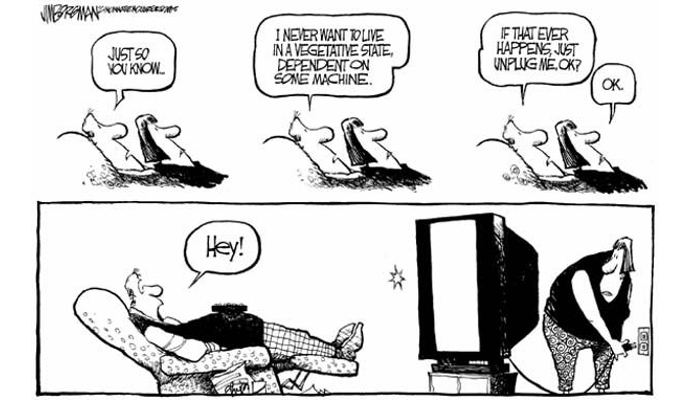
The dictionary defines a living will as “a written statement detailing a person’s desires regarding future medical treatment in circumstances in which they are no longer able to express informed consent, especially an advance directive.”
A recent Supreme Court judgment has made it possible for a person who is terminally ill or in advanced vegetative state to enforce a living will. A living will is a document that states a person’s wish with respect to how they want to be treated if they are terminally ill. The Supreme Court has laid out instructions as to how the living will should be structured.
The person making a living will should be of healthy and sound state of mind and should have the capability to communicate his or her intent and decision clearly. While making a living will, he/she should not be under the influence of someone else or is forced or coerced. The living will should be made voluntarily by the person and not under duress.
A living will must be a written document.
The will should declare that the person making it knows the consequences. It should state at which point treatment should be withdrawn or not given. It must state the circumstances of enforcing such a decision. It should name a relative who can decide on his/her behalf.
The living will should be signed by the maker in the presence of two witnesses. It should be countersigned by the judicial magistrate of first class, confirming that the will has been drawn up voluntarily.
The JMFC will maintain a copy of the will and forward a copy to the registry of the district court of that jurisdiction.

WHAT IS A LIVING WILL / ADVANCE MEDICAL DIRECTIVE ?
Advance medical directives are instruments through which a person express their wishes at a time she is not capable of making an informed decision of how medical treatment should proceed, and how long it should continue, when she is not in a position to make an informed decision by reason of being unconscious or in a coma.
WHO CAN DRAW UP A LIVING WILL / ADVANCE MEDICAL DIRECTIVE ?
An adult who is of a sound and healthy mind and in a position to communicate, relate and comprehend the purpose and consequences of executing the document.
It must be voluntary
It should be in writing and should clearly state as to when medical treatment may be withdrawn or if specific medical treatment that will have the effect of delaying the process of death should be given
ESSENTIAL ELEMENTS OF A LIVING WILL
It should clearly indicate the decision relating to the circumstances in which medical treatment can be withdrawn.
Instructions must be absolutely clear and unambiguous.
It should mention whether the patient may revoke the instructions/authority at any time
It should say that the patient has understood the consequences of executing such a document.
It should specify the name of a guardian or close relative who, in the event of the patient becoming incapable of taking decision at the relevant time, will be authorized to give consent to refuse or withdraw medical treatment
If there is more than one valid Advance Directive, the most recently signed Advance Directive will be considered as the last expression of the patient‘s wishes and will be implemented.
HOW SHOULD THE LIVING WILL BE RECORDED AND PRESERVED ?
It should be signed by the patient in the presence of two witnesses, preferably independent, and countersigned by a jurisdictional judicial magistrate, first class so designated by the concerned district judge
The witnesses and the jurisdictional JMFC have to record their satisfaction that the document has been executed voluntarily and without any coercion or inducement or compulsion
The JMFC has to preserve one copy of the document in his office and forward one copy of the document to the registry of the jurisdictional district court for being preserved.
The JMFC has to inform the immediate family members of the patient and make them aware about the execution of the document.
A copy has to be handed over to the municipal corporation or municipality or panchayat, as the case may be. The authorities shall nominate a competent official, who shall be the custodian of the said document
The JMFC has to hand over a copy of the directive to the family physician
WHEN AND BY WHOM CAN IT BE IMPLEMENTED?
The person becomes terminally ill and is undergoing prolonged medical treatment with no hope of recovery and cure of the ailment, the treating physician, when made aware about the Advance Directive, has to ascertain the genuineness and authenticity of the document from the jurisdictional JMFC before acting upon the same.
The living will should be implemented only after being fully satisfied that the patient is terminally ill and is undergoing prolonged treatment or is surviving on life support and that the illness of the patient is incurable
The hospital where the patient has been admitted for medical treatment has to constitute a medical Board consisting of the head of the treating department and at least three experts from the fields of general medicine, cardiology, neurology, nephrology, psychiatry or oncology of at least twenty years experience who, in turn, have to visit the patient in the presence of his guardian/close relative and form an opinion to certify, or not certify, the instructions in the living will. This decision shall be regarded as a preliminary opinion.
After the hospital medical board certifies that the instructions contained in the advance directive ought to be carried out, the hospital has to inform the jurisdictional collector about the proposal.
*The collector shall constitute another medical board comprising the chief district medical officer as the chairman and three expert doctors from the fields of general medicine, cardiology, neurology, nephrology, psychiatry or oncology
*The chairman of the medical board nominated by the Collector, that is, the Chief District Medical Officer, has to convey the decision of the board to the jurisdictional JMFC before withdrawing the medical treatment administered to the patient. The JMFC shall visit the patient at the earliest and, after examining all aspects, authorise the implementation of the decision of the Board
WHAT IF THE PERMISSION IS REFUSED BY THE MEDICAL BOARD?
If permission to withdraw medical treatment is refused by the Medical Board, it would be open to the patient or his family members or even the treating doctor or the hospital staff to approach the high court.
The chief justice of the high court will have to constitute a division bench to decide upon case.



